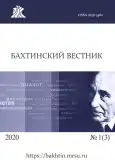Vol 2, No 1 (2020)
- Year: 2020
- Published: 15.03.2020
- Articles: 10
- URL: https://bakhtiniada.ru/2658-5480/issue/view/16992
Full Issue
Theoretical research
Bakhtin’s Historical Turn and Its Soviet Antecedents
Abstract
Based on previous work, the article provides a new understanding of Bakhtin’s ideas on the stratification and historical development of language, drawing on unpublished archival materials of the Institute for the Comparative History of the Literatures and Languages of the West and East (ILIaZV). It focuses on Bakhtin’s work from the late 1930s, when he shifts his attention from language to the historical development of specific images, semantic clusters, and plot structures. Bakhtin still maintained close connections with the work carried out at ILIaZV, but drew upon the work of different scholars, Aleksandr Veselovskii (1838–1906) and Izrail Frank-Kamenetskii (1880–1937), who become important influences on Bakhtin, especially on his idea of carnival as syncretic pageantry as a structuring feature of literature and on his analysis of plot structures and metaphors. The article provides insight into the assumptions behind Bakhtin’s notions of the chronotope and carnival and the prospect of re-grounding these notions, so that they become useful tools for future research.
 4-21
4-21


Bakhtin in Cinema and Adaptation Studies. Part II. Adaptation studies: back to Bakhtin again
Abstract
It is not surprising that the study of Films that are adaptation of literary works has attracted both specialists of Cinema and Literature for a long time. In the last twenty years this topic has developed into a whole academic discipline of its own, especially in the Anglophone world, with a growing bibliography, magazines, manuals, anthologies. One of the thinkers most quoted and used in this growing field is Mikhail Bakhtin. We will sketch here the reasons for this central role, offer a bibliography of research based on his work and examine some of the main contributions to this bibliography and suggest why we think Bakhtinian contributions to the field were the beginning.
 22-25
22-25


Dialogs
Two Postscripts for Bakhtin subjects
Abstract
The article, firstly, clarifies the circumstances of the evacuation of M.M. Bakhtin’s nephew – A.N. Perfiliev from besieged Leningrad (in March of 1942); secondly, analyzes (basing on Bakhtin’s texts) his metaphorical concept “the last whole”, which has become recently relevant in a number of philological publications and reports, but has not received an unambiguous terminological interpretation.
 26-29
26-29


From archives
M.M. Bakhtin's Lecture on Aesthetics recorded by G.M. Zakharova (Berezina). The end of the 1950s
Abstract
The article considers the abstract of M.M. Bakhtin’s lecture on aesthetics, as recorded in the late 1950s by G.M. Zakharova (Berezina) – a (former) student of the philological faculty of Mordovia State University. It reveals the structure of the lecture, the meaningful filling of its sections. The lecture gives a definition of the aesthetic in all its manifestations (in life, in everyday life, in art), the definition of art as creativity “according to the laws of beauty”, the definition of the basic concepts of art historical analysis: color, volume, space, style.
 30-55
30-55


M.M. Bakhtin’s lectures on the history of foreign literature recorded by M.A. Beban. Part 3
Abstract
The paper presents a decoded and commented fragment of M.M. Bakhtin's lectures as he read at the Mordovia State Pedagogical Institute (now N.P. Ogarev Mordovia State University) in the second semester of the academic year 1936/37. It was recorded by M.A. Beban – a Moksha-Mordovian writer, one of the founders of the professional Mordovian literature, that days – a student of the Faculty of Literature. The fragment includes the consideration of the theme “The formation of the Burgher literature (the 12th–13th centuries”).
 56-93
56-93


Materials for the Bakhtin Encyclopaedia
 94-99
94-99


 100-106
100-106


 107-109
107-109


 110-111
110-111


Reviews, scientific chronicles
Scientific conferences. Round tables
 150-153
150-153











